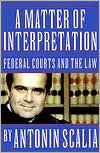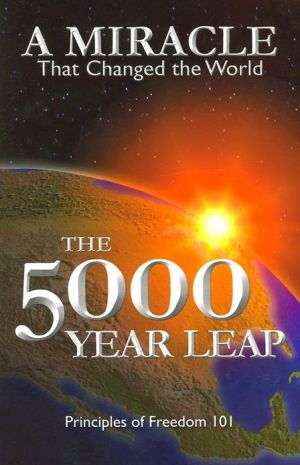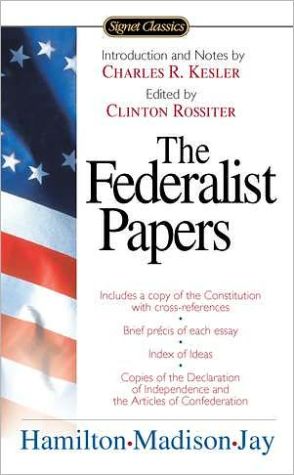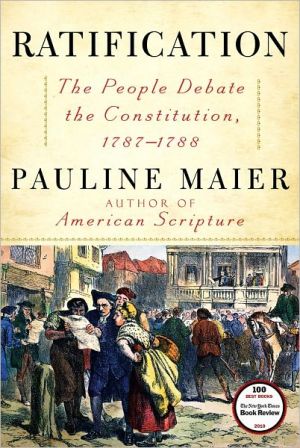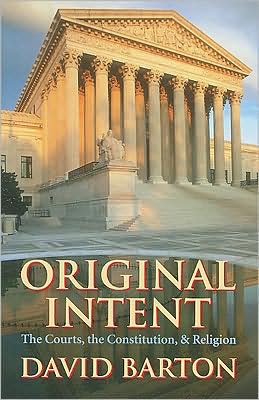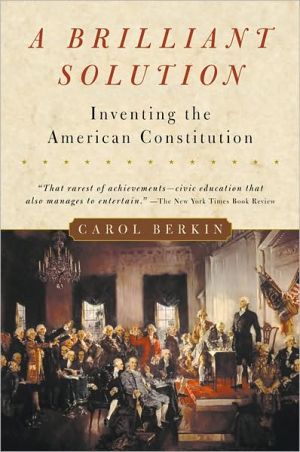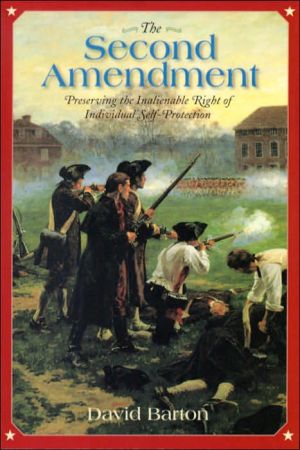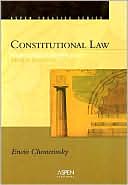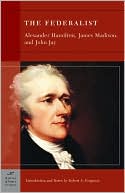A Matter of Interpretation: Federal Courts and the Law
We are all familiar with the image of the immensely clever judge who discerns the best rule of common law for the case at hand. According to U.S. Supreme Court Justice Antonin Scalia, a judge like this can maneuver through earlier cases to achieve the desired aim—"distinguishing one prior case on his left, straight-arming another one on his right, high-stepping away from another precedent about to tackle him from the rear, until (bravo!) he reaches the goal—good law." But is this common-law...
Search in google:
We are all familiar with the image of the immensely clever judge who discerns the best rule of common law for the case at hand. According to U.S. Supreme Court Justice Antonin Scalia, a judge like this can maneuver through earlier cases to achieve the desired aim--"distinguishing one prior case on his left, straight-arming another one on his right, high-stepping away from another precedent about to tackle him from the rear, until (bravo!) he reaches the goal--good law." But is this common-law mindset, which is appropriate in its place, suitable also in statutory and constitutional interpretation? In a witty and trenchant essay, Justice Scalia answers this question with a resounding negative.In exploring the neglected art of statutory interpretation, Scalia urges that judges resist the temptation to use legislative intention and legislative history. In his view, it is incompatible with democratic government to allow the meaning of a statute to be determined by what the judges think the lawgivers meant rather than by what the legislature actually promulgated. Eschewing the judicial lawmaking that is the essence of common law, judges should interpret statutes and regulations by focusing on the text itself. Scalia then extends this principle to constitutional law. He proposes that we abandon the notion of an everchanging Constitution and pay attention to the Constitution's original meaning. Although not subscribing to the "strict constructionism" that would prevent applying the Constitution to modern circumstances, Scalia emphatically rejects the idea that judges can properly "smuggle" in new rights or deny old rights by using the Due Process Clause, for instance. In fact, such judicialdiscretion might lead to the destruction of the Bill of Rights if a majority of the judges ever wished to reach that most undesirable of goals.This essay is followed by four commentaries by Professors Gordon Wood, Laurence Tribe, Mary Ann Glendon, and Ronald Dworkin, who engage Justice Scalia's ideas about judicial interpretation from varying standpoints. San Francisco Chronicle Love him or hate him (it's hard to imagine a neutral opinion), Scalia is a briliant and engaging writer. This tantalizing short debate with his equally brilliant critics shows just how radical our most conservative justice is.
Preface vii Common-Law Courts in a Civil-Law System: The Role of United States Federal Courts in Interpreting the Constitution and Laws Antonin Scalia 3 Comment Gordon S. Wood 49 Comment Laurence H. Tribe 65 Comment Mary Ann Glendon 95 Comment Ronald Dworkin 115 Response Antonin Scalia 129 Contributors 151 Index 153
\ San Francisco ChronicleLove him or hate him (it's hard to imagine a neutral opinion), Scalia is a brilliant and engaging writer. This tantalizing short debate with his equally brilliant critics shows just how radical our most conservative justice is.\ — Kathleen Kahn\ \ \ \ \ SlateAs the most intellectually consistent and stylistically gifted member of the Supreme Court, Scalia has never hidden his enthusiasm for the American tradition of mistrusting courts and lawyers. The basics of his judicial philosophy are now usefully collated into this volume. . . . Scalia's arguments have shaped the debate in our time; he has gone a long way toward changing how judges interpret the letter of the law.\ — David Franklin\ \ \ American Bar Association Journal[Scalia] is formidably persuasive, by turns seductive, fierce, funny, charming—and always brilliant.\ — Paul Reidinger\ \ \ \ \ ReasonA Matter of Interpretation demonstrates both the attraction of Scalia's 'textualist' theory and his qualities as a judicial statesman. . . [His] elegant essay, the most concise and accessible presentation of his views, argues eloquently that judicial authority can only be based on the statutory or constitutional text.\ — Michael Greve\ \ \ \ \ The Wall Street Journal[We] are lucky to have, in book form, an essay on legal interpretation by Justice Scalia....[He] projects a sanguine humor through a robust prose enlivened by sly sallies against what he sees as the gaps in logic of the opposing camp. He is anything but the angry justice of popular myth.\ — John O. McGinnis\ \ \ \ \ The Lawyer's BookshelfJustice Scalia's well-written and patiently explained theory, augmented and challenged by the commentaries of four scholars, will fascinate and enlighten even those readers, and they are many, whom it does not convince. . . . Justice Scalia merits praise for the clarity with which he writes and for the careful thought that underlies his writing.\ — Walter Barthold\ \ \ \ \ The Nation. . . the Supreme Court's highest-profile conservative . . . suggest[s] we ought to junk judicial review as we have known it. . . . The reason, I think, is that Scalia objects not merely to certain decisions of this or prior Courts but to judicial review, American-style, in its entirety. His central aim as a jurist has been to get the federal courts out of the business of adjudicating individual rights.\ — Garrett Epps\ \ \ \ \ The Detroit NewsAntonin Scalia. . . confronts four high-powered critics in a short book for the general public—perhaps the first time a sitting justice of the Supreme Court has done so. This is a book for anyone with a serious interest in law and the Constitution.\ — Carl M. Dibble\ \ \ \ \ The New RepublicAs this . . . book makes clear, Scalia deserves respect for having redefined the mainstream of constitutional discourse, and in a substantially useful way.\ — Jeffrey Rosen\ \ \ \ \ The Wall Street Journal[We] are lucky to have, in book form, an essay on legal interpretation by Justice Scalia....[He] projects a sanguine humor through a robust prose enlivened by sly sallies against what he sees as the gaps in logic of the opposing camp. He is anything but the angry justice of popular myth.\ \ \ \ \ San Francisco ChronicleLove him or hate him (it's hard to imagine a neutral opinion), Scalia is a brilliant and engaging writer. This tantalizing short debate with his equally brilliant critics shows just how radical our most conservative justice is.\ \ \ \ \ The Lawyer's BookshelfJustice Scalia's well-written and patiently explained theory, augmented and challenged by the commentaries of four scholars, will fascinate and enlighten even those readers, and they are many, whom it does not convince. . . . Justice Scalia merits praise for the clarity with which he writes and for the careful thought that underlies his writing.\ \ \ \ \ The Nation. . . the Supreme Court's highest-profile conservative . . . suggest[s] we ought to junk judicial review as we have known it. . . . The reason, I think, is that Scalia objects not merely to certain decisions of this or prior Courts but to judicial review, American-style, in its entirety. His central aim as a jurist has been to get the federal courts out of the business of adjudicating individual rights.\ \ \ \ \ The Detroit NewsAntonin Scalia. . . confronts four high-powered critics in a short book for the general public—perhaps the first time a sitting justice of the Supreme Court has done so. This is a book for anyone with a serious interest in law and the Constitution.\ \ \ \ \ The New RepublicAs this . . . book makes clear, Scalia deserves respect for having redefined the mainstream of constitutional discourse, and in a substantially useful way.\ \ \ \ \ SlateAs the most intellectually consistent and stylistically gifted member of the Supreme Court, Scalia has never hidden his enthusiasm for the American tradition of mistrusting courts and lawyers. The basics of his judicial philosophy are now usefully collated into this volume. . . . Scalia's arguments have shaped the debate in our time; he has gone a long way toward changing how judges interpret the letter of the law.\ \ \ \ \ American Bar Association Journal[Scalia] is formidably persuasive, by turns seductive, fierce, funny, charming—and always brilliant.\ \ \ \ \ ReasonA Matter of Interpretation demonstrates both the attraction of Scalia's 'textualist' theory and his qualities as a judicial statesman. . . [His] elegant essay, the most concise and accessible presentation of his views, argues eloquently that judicial authority can only be based on the statutory or constitutional text.\ \ \ \ \ ReasonA Matter of Interpretation demonstrates both the attraction of Scalia's 'textualist' theory and his qualities as a judicial statesman. . . [His] elegant essay, the most concise and accessible presentation of his views, argues eloquently that judicial authority can only be based on the statutory or constitutional text.\ — Michael Greve\ \ \ \ \ San Francisco ChronicleLove him or hate him it's hard to imagine a neutral opinion, Scalia is a briliant and engaging writer. This tantalizing short debate with his equally brilliant critics shows just how radical our most conservative justice is.\ \ \ \ \ Library JournalHow should judges interpret statutory and constitutional law? Gutmann politics, Princeton; Democracy and Disagreement, LJ 12/15/96 has edited an admirable work focusing on the relationship of the federal courts in interpreting the law. Supreme Court Justice Scalia's essay elaborates on his philosophy of textualism, an approach that eschews legislative intention in favor of focusing on the original meaning of the text to be interpreted. He applies this principle to constitutional law, arguing that we should concentrate on the Constitution's original meaning. Following this essay are brief comments by noted legal scholars Ronald Dworkin, Mary Ann Glendon, Lawrence Tribe, and Gordon Wood. It's deceptively easy to simplify Justice Scalia's ideas to a single sentence, as Gutmann does in her preface: "laws mean what they actually say, not what legislators intended them to say but did not write into the law's text." But the debates over the manner of interpreting legal texts have been held since the very beginning of our constitutional government. This collection certainly isn't the final word, but it offers an excellent starting place. For academic collections.-Jerry E. Stephens, U.S. Court of Appeals Lib., Oklahoma City\ \ \ \ \ Sue DavisReaders of THE LAW AND POLITICS BOOK REVIEW may have noticed that THE NEW YORK TIMES BOOK REVIEW'S recent "Hit Parade" of books published by university presses included Justice Scalia's book (June 15, 1997, page 39). A MATTER OF INTERPRETATION apparently ranks with such distinguished tomes as THE CHICAGO MANUAL OF STYLE and Norman Davies' EUROPE: A HISTORY. Does it deserve such high esteem? I think not. The reasons should become clear in the review that follows. Invited to deliver the Tanner Lectures at Princeton University, Justice Scalia took the opportunity to describe the merits of his preferred method of constitutional interpretation-textualism-and to condemn approaches based on the intent of the Framers and an evolving Constitution. Scalia's essay, "Common-Law Courts in a Civil-Law System: The Role of United States Federal Courts in Interpreting the Constitution and Laws," actually comprises only forty-seven pages-a bit less than a third of the book. The remainder of the volume consists of comments from Gordon S. Wood, Laurence H. Tribe, Mary Ann Glendon, and Ronald Dworkin; the Justice's response provides a conclusion. The manner in which Scalia presents his argument that textualism is neither simplistic nor result-oriented, but logically consistent and rigorous, in fact, the only correct approach to interpreting the Constitution conveys his confidence that all reasonable readers will find the merits of his approach to be beyond question. Scalia eases into his argument with a discussion of the common law-not really common or customary law at all, he notes-and its uncomfortable relationship with democracy. Proceeding to an explanation of the problem of statutory interpretation, he reveals what he sees as the fundamental error of searching for the intent of the legislature. In Scalia's view, not only is legislative intent inconsistent with the principle that, "It is the law that governs, not the intent of the lawgiver" (page 17), but relying on legislative intent makes it too easy for judges to mold the law to fit their own preferences. Thus, "The practical threat is that, under the guise or even the self-delusion of pursuing unexpressed legislative intents, common-law judges will in fact pursue their own objectives and desires, extending their lawmaking proclivities from the common law to the statutory field" (pages 17-18). That discussion sets the stage for Scalia to present textualism as the obviously correct approach to interpreting statutes and the Constitution. Textualism purportedly limits judicial discretion, holding judges to the law. Consequently, for Scalia, textualism is the only approach to both statutory and constitutional interpretation that is faithful to the principles of democracy. Indeed, he suggests that we will embrace textualism if we believe that judges "have no authority to pursue those broader purposes [for which a statute could be designed] or write those new laws [that the times require]"(page 23). The confidence with which Scalia answers the question of how the Constitution should be interpreted" is grounded on the familiar assertion that officials who have not been elected should not invalidate or even modify the policies made by the elected branches of government. Only on the rare occasion when a policy in obviously in violation of an explicit constitutional provision is the judiciary justified in taking action. Most readers are likely to notice a number of flaws and inconsistencies in Scalia's argument. Perhaps Political Scientists will object that the will of the majority does not always prevail in legislative decision-making and that policies made by elected officials have been known to controvert democracy. Scalia does not address such issues, however. Indeed, a list of decisions to which he objects includes some in which the Court struck down legislation that interfered with the democratic process. For example, he notes that "a few things that formerly could be done or not done, as the society desired, but now cannot be done" include the following. "[E]lecting one of the two houses of a state legislature.on a basis that does not give all voters numerically equal representation" (REYNOLDS V SIMS, 1964) and "imposing property requirements as a condition of voting" (KRAMER V UNION FREE SCHOOL DISTRICT, 1969) (pages 41-42). Scalia seems to conceive the Constitution as a set of rules that protect democracy, which he views simply as majority decision-making by legislative bodies. He does not explain, however, how the text of the Constitution supports that view. Indeed, provisions in the Bill of Rights supply textual support for a very different view of the Constitution: an aspirational document that protects fundamental rights against unreasonable majorities. Moreover, his concluding remarks raise questions about his commitment to the majoritarianism that seemingly forms the basis of his entire argument. While he laments the dominance of the evolutionist approach or "The Living Constitution, a `morphing' document that means, from age to age, what it ought to mean" (page 47), he does not refer at this point, to the counter-majoritarian problem. Instead, he contends that the politicization of the judicial selection process has inevitably accompanied the rise of the changing Constitution. Consequently, if the courts are going to change the Constitution, they will do so in the way the majority wants: "This, of course, is the end of Bill of Rights, whose meaning will be committed to the very body it was meant to protect against: the majority." The reader is left to wonder what it is that Justice Scalia fears about the evolving Constitution? Is it the threat of excessive power in the hands of an elite group of non-elected judges who are not responsible to the people? Or is it the danger of the tyranny of the majority? Laurence Tribe and Ronald Dworkin have provided critiques that are based on arguments they have published previously. Although there are no real surprises in their essays, they manage not only to bring a number of inconsistencies in Scalia's argument to the reader's attention but to add considerably more than the Justice's essay does to our awareness of the complex nature of constitutional interpretation. Tribe, for example, demonstrates that "Scalia is by no means always faithful to his approach" (page 66): The Justice maintains that textualism leads to the conclusion that the Constitution does not prohibit the death penalty. Indeed, he finds support for capital punishment in the Grand Jury Clause of the Fifth Amendment (no person shall be held to answer for a capital crime without grand jury indictment), and in the Due Process Clauses of the Fifth and Fourteenth Amendments (prohibiting deprivation of life without due process of law). Tribe points out that in order for Scalia's conclusion to follow from his textual evidence, he must rely on the expectation of the writers and ratifiers of the Constitution that the death penalty would never qualify as cruel and unusual punishment prohibited by the Eighth Amendment. Yet Scalia has made it clear that expectations of the Framers should not be considered in interpreting the Constitution as only the text's meaning is properly part of an interpreter's inquiry. Additionally, to Tribe the Justice's votes in the flag burning and hate speech cases suggest that "he has in fact.been guided by a conception of the First Amendment that embodies.a set of principles whose understanding may evolve over time" (page 81). Tribe notes that there is nothing in the text of the document that proclaims the Constitution's text to be the sole point of reference. Further, he notes, "even if there were, the question of how the text's meaning is to be ascertained would remain unanswered" (page 78). By underlining the complexities of the issues surrounding constitutional interpretation and by revealing inconsistencies in Scalia's argument, Tribe raises serious questions about Scalia's textualism. Dworkin is perhaps even more effective than Tribe in pointing out the inconsistencies in Scalia's argument. Dworkin uses the distinction between "semantic originalism," which holds that the rights-granting clauses must be read to say what those who made them intended to say, and "expectation originalism" which requires those clauses to have the consequences that those who made them expected them to have. Scalia's explanation of his textualism indicates that he is a semantic-originalist, yet he sometimes acts more like an expectation-originalist. For example, his insistence that the view that capital punishment is unconstitutional is obviously preposterous is consistent with expectation originalism. Dworkin also points out that what Scalia calls the "morphing" theory of the Constitution, which he insists is the dominant interpretive approach, is not only "hardly even intelligible.[but] no prominent contemporary judge or scholar.holds anything like it" (page 122). Indeed, according to Dworkin, the approach referred to as "The Living Constitution" is more accurately understood as endorsing the view that "key constitutional provisions, as a matter of their original meaning, set out abstract principles rather than concrete or dated rules" (page 122). That is a view that Scalia, if he were genuinely a semantic-originalist, might be expected to hold himself. It should not be surprising that Scalia disagrees with virtually all of both Tribe's and Dworkin's criticisms. Although he provides some clarifications and even reformulates some of his argument to minimize the force of their objections, his response amounts to little more than, "I disagree with you". Despite his confidence in the correctness of his interpretive philosophy, Scalia's argument does not hold up under scrutiny. I look forward to reading Richard Brisbin's JUSTICE ANTONIN SCALIA AND THE CONSERVATIVE REVIVAL in the hope that it will shed more light on the motivations that drive the Justice's decision-making than Scalia's own explanation offers.\ \ \ \ \ Kirkus ReviewsSupreme Court Justice Scalia posits his views of how statutes and the Constitution should be interpreted; a noted historian and three distinguished legal scholars respond.\ Scalia, whom journalistic shorthand often renders the intellectual leader of the Court's right wing, sets forth the principles of what he calls "textualism" and others call "original intent." To reduce a complex and subtle argument to a sentence, he believes that judges should discern a law's import from the words in which it is stated, not from divining the legislative intent behind its passage or interpreting the text through analysis of its historical context; he finds the application of common-law adjudicature to constitutional issues a threat to democracy. Apart from Mary Ann Glendon, who contributes a rather dry comparison of the techniques of statutory interpretation in European civil-law countries with those derived from our common-law traditions, the replies take exception to Scalia's method. Glendon's Harvard Law School colleague Laurence Tribe lauds Scalia's insistence on a close reading of statutory texts but contends that specific constitutional language must be studied "in light of the Constitution as a whole and the history of its interpretation"; he doubts that any set of "rules" for constitutional exegesis is possible. Ronald Dworkin, of New York University Law School, finds textualism inadequate for constitutional analysis because "key constitutional provisions, as a matter of their original meaning, set out abstract principles rather than concrete or dated rules." Brown University historian Gordon Wood disputes Scalia's contention that judges only recently began usurping authority from elected legislatures. Although all of the authors write clearly, it is unlikely that anyone not fairly well versed in constitutional law will fully grasp their arguments.\ A small but worthwhile addition to the literature.\ \ \
